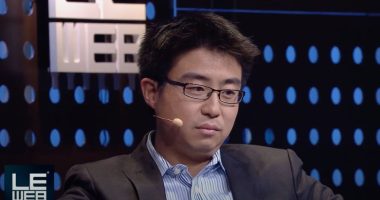
“The world is in a chaotic situation,” said Chief Executive Masayoshi Son, citing Covid-19 and Russia’s invasion of Ukraine. “In this chaotic world, the approach we at SoftBank should take is defense.”
The comment came after SoftBank reported a net loss of ¥1.71 trillion, equivalent to $13.2 billion, for the fiscal year that ended March 31. That was its biggest full-year loss, topping a record set two years ago, and followed a nearly ¥5 trillion net profit the previous fiscal year.
Mr. Son said the company was making new investments at a slower pace this fiscal year. He predicted that the total for the year would be only a quarter or half the level of the previous year, when SoftBank made about $46 billion in investments through its Vision Fund and Latin American funds.
The company’s results tend to swing widely because they follow the volatile movements of the technology shares in which SoftBank has invested, including U.S. companies such as Uber Technologies Inc. and DoorDash Inc.
SHARE YOUR THOUGHTS
What do you think of SoftBank’s results? Join the conversation below.
Interest-rate increases by the Federal Reserve and other central banks, as well as tighter Chinese government regulations on the tech industry, have weighed on valuations of high-growth tech stocks. Former stars in SoftBank’s portfolio such as Chinese ride-hailing leader Didi Global Inc. have been tarnished.
Mr. Son said he would select his targets with stricter due diligence and be careful of investing in Chinese companies.
“Because the 475 companies we have invested in are gradually reaching harvest season, we can manage to survive,” Mr. Son said. “We may not be able to plant new seeds in the next year or two, but I expect the stock market to start recovering after one or two years.”
Among the many signs of tribulation littering SoftBank’s 117-page earnings statement was an investment loss of $26.2 billion in the first three months of this year in its principal funds. Those are the Vision Fund 1, which has completed its investments, the Vision Fund 2, which is still making new investments, and the Latin American funds.
The publicly listed stocks that compose much of the first Vision Fund have fallen by more than half since the start of the year. Didi is down more than 80% since its debut on the New York Stock Exchange last summer, which was followed by run-ins with Chinese regulators that led Didi to plan to delist from the NYSE.
SoftBank’s shares fell 8% Thursday in Tokyo trading, which ended before the release of the results. Thursday’s close of ¥4,491 was less than half the level a year ago.
Another headache for Mr. Son is unwinding an arm called SB Northstar that was started in 2020 to invest in big, publicly traded tech stocks. SoftBank said Thursday that Northstar lost a total of nearly $6 billion since its inception, and Mr. Son said the fund had mostly stopped operating.
The CEO contributed a part of Northstar’s capital and will personally take a hit of more than $2 billion, SoftBank said.
SoftBank’s fate is no longer linked so closely to Alibaba Group Holding Ltd. , the Chinese internet and e-commerce company.
As recently as September 2020, SoftBank’s Alibaba stake accounted for more than half of its total asset value. As of March 31, SoftBank’s nearly one-quarter stake in Alibaba accounted for just 22% of its net asset value. That makes it harder for SoftBank to use the stake as a piggy bank for other investments.
Mr. Son said he would focus on chip designer Arm, which is owned by SoftBank, as a way to make money without spending more cash. He said he expected demand for chips to continue growing. He also confirmed that Arm’s China operation has returned to normal after a dispute with a former CEO that at one point left the China operation without a corporate seal needed to do business.
SoftBank said in February that it planned a public offering of Arm shares by March 2023 after a deal to sell the unit to Nvidia Corp. fell apart. Mr. Son said the offering could be delayed by three to six months if market conditions worsen.
“We put up an umbrella when it rains,” Mr. Son said. “We need to think flexibly, depending on the situation. But it is the time to strengthen our defense now.”
Write to Megumi Fujikawa at [email protected]
Copyright ©2022 Dow Jones & Company, Inc. All Rights Reserved. 87990cbe856818d5eddac44c7b1cdeb8








